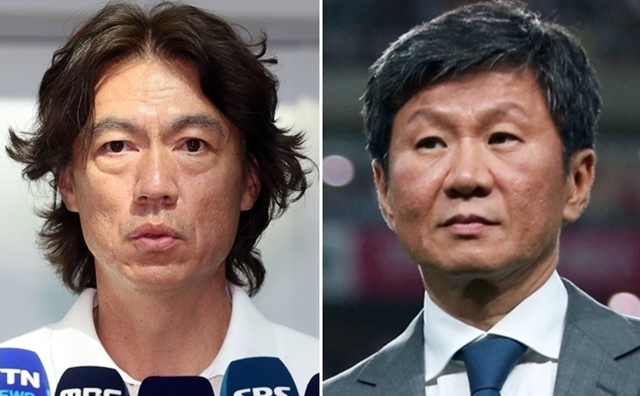KFA Loses Trust: Korean Football in Crisis
An absolute ‘omnishambles.’ Over the past few months, the disappointing actions of the Korean Football Association (KFA) have come in for criticism from many football fans and the football community. Some have even referred to the recent appearance of the KFA as the “darkest time in Korean football history,” and the intensity of the criticism continues to grow. However, the KFA, the main target of this backlash, has shown little response to the criticism directed at them.
From the appointment of Jürgen Klinsmann, who ended the Asian Cup in February with a disappointing performance, to his dismissal and the subsequent five- month process leading up to the selection of Hong Myung- bo in early July, the KFA’s actions were inevitably criticized as nothing short of “hasty administration.” In this article, we will explore the controversies surrounding the national team and the KFA over the past few months, as well as the reasons behind the growing criticism. We’ll also examine why the fans, who are the foundation of any sport, are increasingly turning their backs on the current situation. Ultimately, we aim to propose the changes and reforms necessary for Korean football to regain the love and trust of its supporters.
 |
| ▲ South Korean supporters display a banner condemning the KFA (Source: Jeonnam Ilbo) |
From Klinsmann to Hong Myung- bo: Endless Controversies
In the 2022 Qatar World Cup, the South Korean national football team achieved a remarkable feat by advancing to the knockout stage. This success sparked the speculation about whether Paulo Bento, who led the team, would be offered a new contract. His existing contract was set to expire at the end of the World Cup. However, Bento announced his departure from the South Korean national team following the World Cup. The disagreement over the terms of the contract between Bento and the KFA was the main cause of his exit.
After the World Cup, the South Korean national team sought a new head coach to fill the vacant position. As a result, in February 2023, Jürgen Klinsmann was appointed as the new head coach. However, concerns began to arise as soon as Klinsmann was appointed. This apprehension stemmed from his previous track record before taking on the role. His history of lacking tactical strategies and his controversial practice of terminating contracts via ‘Facebook’ had left many with doubts about his suitability for the position. Despite the concerns, the South Korean national team, aiming for victory in the 2024 Qatar Asian Cup, seemed to settle into a wait- and- see attitude.
The results were devastating. Despite the high hopes and expectations surrounding the so- called “Golden Generation,” South Korea ultimately faced a bitter disappointment by being eliminated in the semifinals. Before the disappointment of the result had even begun to fade, controversies surrounding the national team started to emerge. The British tabloid ‘The Sun’ reported a shocking revelation: a conflict between players in the South Korean national team occurred the day before the semifinal match, with key figures Son Heung- min and Lee Kang- in at the center of the dispute. Soon after, the KFA officially confirmed the report.
It is highly unusual for a team to quickly acknowledge internal player conflicts. Issues concerning Klinsmann’s coaching abilities and leadership, as well as administrative suspicions surrounding his appointment, were quickly overshadowed by the emerging conflict within the team. However, as the focus shifted back to the core issues with the coach and the KFA, the association ultimately convened a meeting to evaluate the results of the Asian Cup and discuss the future of Klinsmann. Ultimately, the KFA decided to dismiss Klinsmann about a year after his appointment, agreeing to pay a substantial penalty for his dismissal. The KFA's handling of the situation from the Asian Cup through to Klinsmann's dismissal was deeply disappointing. The association, which should have been protecting the players above all else, instead shifted the blame for the unsatisfactory results onto them.
The South Korean national team once again assembled the Strengthening Committee to find a new head coach. In response to the controversies, the committee began holding regular briefings on the coaching selection process and announced its intention to hire a foreign coach. Soon after, reports emerged that globally renowned coaches such as Jesse Marsch, Herve Renard, and Senol Günes were positive about the opportunity to coach the South Korean national team. This sparked intense interest in the head coach position, making it a hot issue. However, the discussions about appointing a new head coach, which began in February, went silent for five months. During this period, the national team went through two interim coaches and continued to play matches. With the 2026 World Cup qualifiers approaching, it was crucial to appoint a permanent coach as soon as possible.
In early July, it was suddenly announced that Hong Myung- bo, the Ulsan HD coach, had been appointed as the new head coach of the South Korean national team. The appointment of Hong Myung- bo was seen as the “worst- case scenario,” coming after negotiations with several high- profile foreign candidates had repeatedly fallen through, leaving many disappointments. Hong Myung- bo, who was the head coach of Ulsan HD in the K League, was unexpectedly appointed as the national team coach. Given that Hong Myung- bo had consistently expressed negative views about taking on the head coach role, Ulsan supporters and K League fans felt they had been truly “betrayed.” What was even more shocking was the process behind Hong Myung- bo’s appointment. The entire five- month effort of scouting candidates, conducting document reviews, and holding interviews seemed to have collapsed. It was soon revealed that the appointment was made after Lee Lim- saeng, the head of the Strengthening Committee, personally visited Hong Myung- bo’s home to request him to take the position. The appointment was completed without any document review or interviews.
 |
| ▲ Hong Myung-bo, the head coach of the South Korean national team, and Chung Mong-kyu, the president of the KFA (Source: The Seoul Shinmun) |
Criticism Towards Poor Administration and the MCST's Decision
The football community sent numerous messages of criticism toward the administration’s disregard for procedures. The media and football YouTubers strongly demanded the resignation of Chung Mong- kyu, the KFA president, holding him accountable as the ultimate person responsible for the situation. Among the criticisms, the revelation by Park Joo- ho, a former national team player and former member of the Strengthening Committee, was decisive. Through his YouTube channel, Park Joo- ho expressed his disappointment, stating, “The past five months have been very regrettable and unfortunate. It feels truly hollow,” highlighting his frustration with the mismanagement of the Strengthening Committee. Park Ji- sung, a former captain of the South Korean national team, also pointed out, “Trust in the association has eroded, and it will take a long time to restore it. We need to speak the truth and move forward.” The KFA’s response to the controversy was shocking. They announced that they were considering legal action against Park Joo- ho’s revelations.
Amid the ongoing controversies surrounding the KFA, the Ministry of Culture, Sports and Tourism (MCST) took decisive action. After receiving reports about the suspicions surrounding Hong Myung- bo’s appointment, the MCST identified issues during a preliminary investigation of the KFA. They eventually decided to conduct a full audit and announced that an investigation would proceed. An MCST official stated, “We will focus on examining the controversy surrounding Coach Hong’s appointment process and whether the procedures were properly followed. If there are clear violations, extreme measures may be taken,” signaling a full- scale response.
In response, the KFA strongly protested, warning that political pressure could lead to FIFA sanctions. They cautioned that such sanctions might result in the suspension of their association's status, potentially depriving them from the opportunity to participate in international tournaments, including the World Cup. Ultimately, the KFA stated that they would cooperate sincerely with the MCST's audit. However, when the audit began, they displayed a non- cooperative attitude by refusing to submit documents, citing confidentiality clauses and business secrets as reasons. Nonetheless, the MCST decided to summon key figures from the KFA, including President Chung Mong- kyu, Coach Hong Myung- bo, and Technical Director Lee Lim- saeng. The investigation is scheduled to begin on the 24th of September.
President Chung’s Bid for a Fourth Term?
Despite the ongoing controversies surrounding the KFA, Chung Mong- kyu, the person directly responsible, has only shown a “head- in- the- sand” approach in his response. His recently published book, “The Era of Football,” has sparked considerable attention and controversy among football fans. In his book, he states, “If someone were to rate the achievements made during my term, I would like to respond that it would be around 8 out of 10.” He also claims that “Football YouTubers who have never experienced being players or coaches have excessively worsened public opinion about the KFA,” showing an attempt to deflect all the criticism directed at himself and the KFA. Despite facing numerous criticisms, President Chung’s ultimate goal is to secure a fourth term as KFA president. With his influence at Hyundai Group diminishing, the KFA presidency represents his last significant stronghold. Nevertheless, Minister Yoo In- chon of the MCST has warned that, given the controversies surrounding the KFA and the ongoing audit process, Chung Mong- kyu's bid for a fourth term might face significant challenges.
No Future Without Fan Support
Until now, South Korean football has failed to meet the expectations and enthusiasm of its fans. From the controversy surrounding Klinsmann to Hong Myung- bo’s appointment, the KFA has made numerous mistakes, leading to a significant erosion of fan trust. The KFA's opaque administration and procedural disregard signify a collapse of their fundamental system. Such flawed practices must not be allowed to continue. Fans have already shown the KFA a “red card.” This is not just a matter of isolated criticism; it signifies that Korean football must drive fundamental changes at the systemic level to regain the trust of its fans. Sports cannot exist without fans. The KFA must now listen to the voices of the fans and restore trust through transparent and fair operations. The KFA must build a national team where players’ efforts are not undermined, and the fans’ passion is fully reflected. The KFA, including those responsible for the situation such as President Chung Mong- kyu and Coach Hong Myung- bo, must now make decisive actions. It is time to raise the "red card" against the misconduct that is harming Korean football.
By Kim Han-seul, reporter hozejunior@naver.com
<저작권자 © The Campus Journal, 무단 전재 및 재배포 금지>

 KTX Fares to Increase; First Time in 14 Years: Is it an Inevitable Decision
KTX Fares to Increase; First Time in 14 Years: Is it an Inevitable Decision


![[Feature] Successful Robot Dunk Shot: Can Korea Seize the Opportunity to Narrow the Technological Gap?](/news/thumbnail/202503/4113287_1940_2236_v150.jpg)

